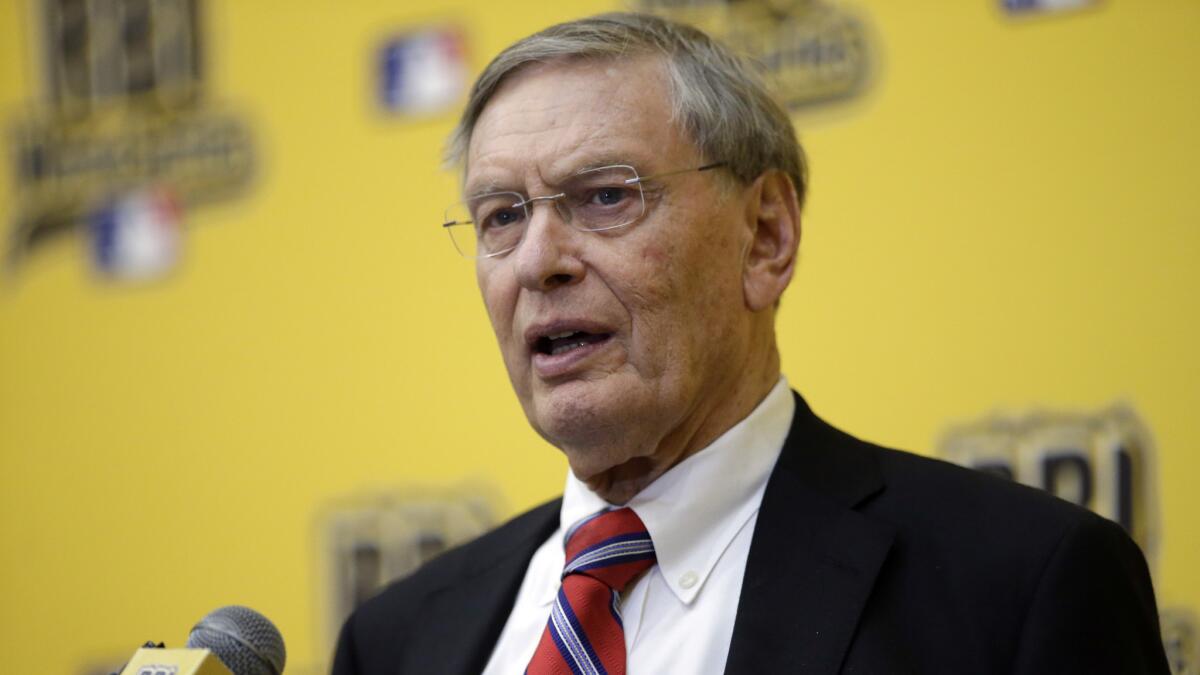Baseball commissioner vote could result in a coup

MLB Commissioner Bud Selig speaks to reporters during a news conference in Grapevine, Texas, on Aug. 6. Rob Manfred, who Selig wants to succeed him as commissioner, is no longer the lone candidate in the running for the job.
- Share via
Thursday was supposed to be Coronation Day, at least the way Bud Selig planned it. Baseball’s owners would unanimously approve his lieutenant and handpicked successor, Rob Manfred, as the new commissioner. Selig would smile for the cameras, his arm around Manfred’s shoulder, and the torch would have been passed smoothly.
Instead, Thursday’s vote might turn into something of a palace coup. The owner with the longest and allegedly greatest loyalty to Selig has turned on him, and so the ballot for Thursday’s election will have three names, not one.
Jerry Reinsdorf, the Chicago White Sox owner who helped oust Fay Vincent as commissioner in 1992 and helped install Selig, wants to reprise his role as kingmaker. Reinsdorf led a small group of rebel owners — the Angels’ Arte Moreno among them — that chose Boston Red Sox chairman Tom Werner as their candidate.
The third candidate is Tim Brosnan, baseball’s executive vice president for business. He is not expected to win, but he could be a kingmaker if he could deliver a small bloc — even two or three votes — to either Manfred or Werner.
If the winner needed to get two-thirds of the vote, Manfred might be a shoo-in. But this election requires three-fourths, and the difference between 20 and 23 votes could determine whether Selig’s successor is decided on the first ballot Thursday, or in multiple rounds of voting, or not decided at all.
Selig all but designated Manfred as heir apparent last September, when he appointed him as chief operating officer. For the first time in three years, Selig had designated a clear No. 2 in the commissioner’s office.
In two of the most critical areas of Selig’s success — an increasingly tough drug program amid resistance from the players’ union, and two decades of labor peace that set the stage for a jump in annual revenues from $1 billion to $9 billion — Manfred was the point man. When Selig finally decided former Dodgers owner Frank McCourt had to go, he told Manfred to figure out how to get it done.
With baseball’s collective bargaining agreement two years from expiration, the Reinsdorf/Werner camp reportedly sees an opportunity to replace the pragmatic Manfred and take a harder line against the players’ union. That would be a particularly unfortunate stance, since this week marks the 20th anniversary of the last strike — the one that killed the 1994 World Series, all because the owners pushed for a salary cap they never got.
The competitive balance in baseball is much better than in the NBA, which has a salary cap. Reinsdorf should know this better than any other owner, since he also owns the Chicago Bulls. There would be no pretense that a salary cap would improve parity in baseball, just the profits of the owners.
However, according to someone familiar with the thinking of the Reinsdorf/Werner camp, labor peace is a given. If so, and if Manfred’s strong suit is an ability to get deals done with the union, how valuable might that trait be in the future? Why not Werner, whose credentials as a team owner and a Hollywood producer might give him ideas about how to energize a sport that has become fairly stagnant in popularity, at least in the United States?
If Selig was so esteemed among his fellow owners because he once was one, why not Werner? Manfred is a lawyer, not an owner. The commissioner works for the owners, not the fans.
The sport is not in crisis. Manfred is the favorite, and he could quit if not elected, taking his decades of labor expertise with him. Yet all Werner and Brosnan need to throw the process into chaos is to combine for eight votes on the first ballot, triggering what could be an unseemly round of promises in exchange for votes.
The owners heard presentations from all three candidates in Baltimore on Wednesday, then adjourned to take in an Orioles game and no doubt to try to broker deals between innings. The process could change with any deal, but one person familiar with the proceedings said early Wednesday that he saw “no chance” a new commissioner is elected on the first ballot.
That person likened the scramble for votes to Washington lobbying, and he expressed concern that the owners might not be able to overcome the division and come to what he called “a Kumbaya moment” upon the election of a new commissioner. The soundtrack for this election, certainly, is not a spiritual.
More to Read
Go beyond the scoreboard
Get the latest on L.A.'s teams in the daily Sports Report newsletter.
You may occasionally receive promotional content from the Los Angeles Times.











